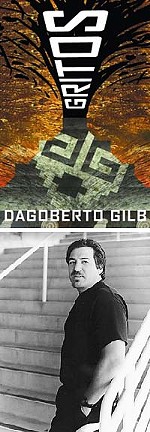Orpheus and Company: Contemporary Poems on Greek Mythology
Chronicle reviewer David Garza wrestles with Orpheus and Company, a collection of contemporary poets retelling ancient myths.
Reviewed by David Garza, Fri., Sept. 3, 1999

Orpheus and Company: Contemporary Poems on Greek Mythology
edited by Deborah DeNicola
University Press of New England, $19.95 paper
The task of retelling ancient myths is perhaps an easy trap to fall into. With their enduring tales of sex and mutilation, war and glory, the legends of the ancient world lend structure to contemporary lives and passions, as well as legitimating the numberless strands of historicity that have unravelled to bring us where we are today; it's not for nothing that we employ words like "odyssey" as the brand name of a minivan as well as a multipurpose metaphor that can describe anything from a political campaign to a football season.
But the words of the ancient world are also a trap, because the implications of retelling are enormous. Deborah DeNicola's Orpheus and Company: Contemporary Poems on Greek Mythology displays well both the perils and triumphs of refiguring these tales. Divided into 12 sections based on mythical subjects (Orpheus and Eurydice, Narcissus, etc), the book represents not only various interpretations of classic fables but vastly disparate forms of poetic expression. Consider the renderings of the myth of Narcissus offered by Gary Miranda and Deborah Pease on facing pages in this book. Miranda, assuming the psyche of his subject, achieves an insightful and seductive opening to his poem: "I have always known this: my being/was an excessive gloss on my own/attempt to communicate, a wheel/on which a dream of wheels spun." Pease, contemplating the same figure, delivers a slightly confounding result: "Narcissus never knew/Emily Dickinson./Post-Narcissus tries/To destroy her."
The poem by Pease demonstrates one of the implications of the exercise of retelling: It inevitably involves an act of unchecked possession. Pease has made the myth of Narcissus exclusively her own and worked it into a complex argument of what? Feminism, perhaps, or solitude. Poets, of course, have every right to work at this possession. Strung together in an anthology of this magnitude, however, the poems risk revealing themselves as personal meditations with little relevance to the mechanics and historical function of mythology. The Narcissus of this poem may as well be Bill Clinton.
This leads to the most dangerous trap involved in the act of retelling: The mythological characters, with all their familiarity and timelessness, are too easily used as void figures, empty names that the poets flippantly attempt to fill with not-quite-relevant personal, political, or cultural roles. Many of the poets collected in the volume forget that the exercise of retelling should also involve the act of rediscovery. True, DeNicola deserves high credit for assembling a provocative collection of contemporary poems that stand united by their appreciation of classical mythology. But the moments when that appreciation is paid in thoughtful, selfless lines of poetry are not quite as frequent as one hopes. Every now and again, though, as in Peter Meinke's urban modernization of Helen of Troy, the ancient characters are rediscovered, felt anew, made shocking once again, treated with the delicate fingers of a child suspended in wonder: "And on the cement pedestal, between / the burning figures and the cool grass,/is scrawled in printing recognizably obscene,/Helen Goldberg is a good peece (sic) of ass."










